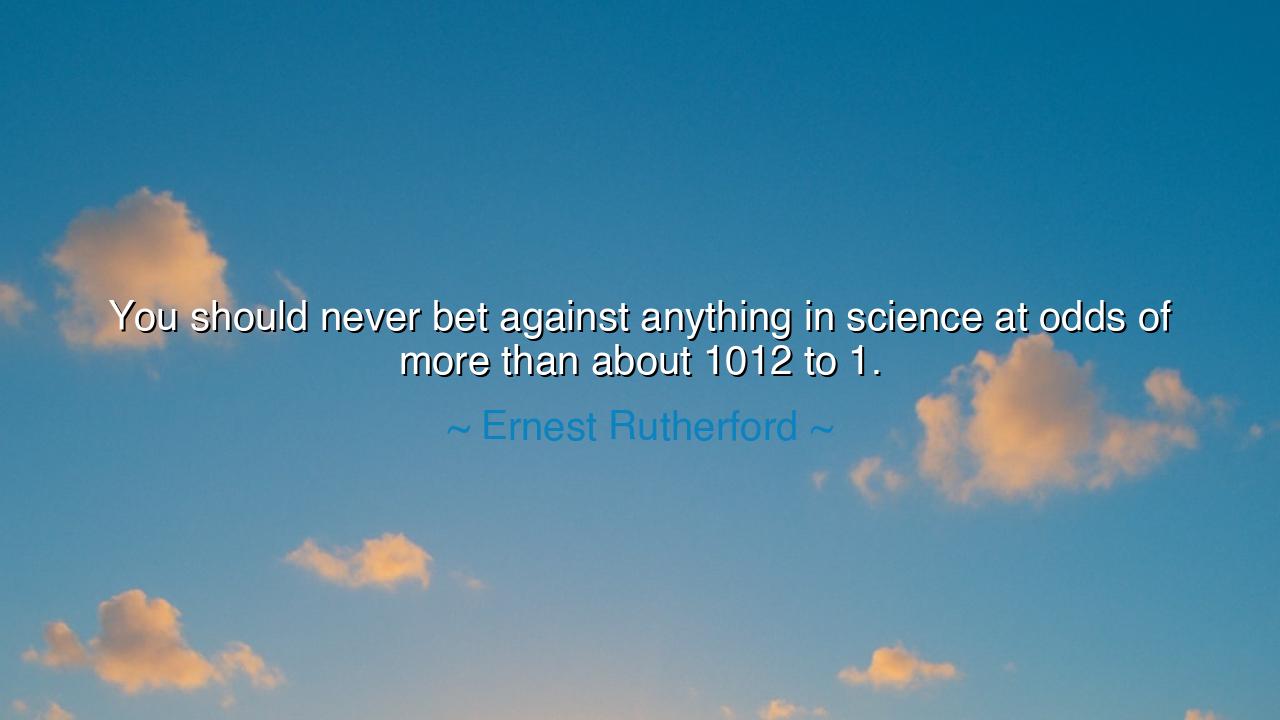
You should never bet against anything in science at odds of more






Listen closely, O seekers of wisdom, for I bring to you the words of Ernest Rutherford, a man who stood at the very heart of modern science and unlocked the mysteries of the atom. “You should never bet against anything in science at odds of more than about 10¹² to 1.” These words are not just a caution; they are a revelation. They speak of the very nature of science, its power, its unpredictability, and its capacity to surprise even the most steadfast beliefs. Rutherford’s statement reflects a deep truth—science, though it may seem bound by the laws of nature, is constantly capable of revealing the unimaginable.
In the days of the ancients, when the stars were seen as the domain of the gods, and the mysteries of the universe were attributed to the whims of powerful deities, there were those who sought not just to understand the world, but to master it. Pythagoras, with his understanding of numbers, and Aristotle, with his system of logic, were the early scientists, seeking not only to describe but to explain the forces that shaped the world. Yet, even in their time, there was the recognition that knowledge was a living thing, a force that could evolve and transform. Rutherford’s words echo this ancient understanding—that even the most profound and tested truths are never fully safe from the challenge of new discovery.
Consider, for example, the tale of Galileo Galilei, who, armed with his telescope, dared to defy the ancient belief that the Earth was the center of the universe. In his time, the church held that the heavens revolved around the Earth. But Galileo, through his observations, uncovered a truth that shattered this belief. His discovery, though it met with fierce resistance, marked a turning point in human understanding. Galileo bet against the prevailing wisdom of his day, and though his odds were long, he was proven right. It was not the strength of the evidence alone, but the persistence of the scientific method that eventually triumphed. Herein lies the deeper meaning of Rutherford's words: in science, even the most established truths are subject to change, for the unknown is always lurking, ready to surprise us.
Rutherford’s quote reminds us that science is not a realm of rigid certainty but of possibilities—vast, unknown possibilities. It was Rutherford himself, after all, who discovered the structure of the atom, leading to the unraveling of nuclear physics and the atomic age. Before his work, many believed that the atom was the most basic and indivisible unit of matter. Yet, Rutherford’s experiments revealed a world within the atom—a tiny nucleus, surrounded by electrons. This discovery shattered the old beliefs and opened the door to an entirely new realm of understanding. The odds of such a breakthrough were once seen as improbable, but science is not bound by convention; it is bound only by the limits of our imagination.
In the 20th century, Albert Einstein delivered another example of the unpredictability of science. His theory of relativity, which challenged the foundations of Newtonian physics, was seen by many as an audacious idea, fraught with risks and uncertainties. For years, it was met with skepticism. The notion that time and space could bend and warp was seen as a fantastical leap. Yet, Einstein’s theories were confirmed by the eclipse of 1919, when his predictions about light bending around the sun were proven true. Again, the odds were stacked against him, but the universe had its own plan, and science was ready to reveal it. Just as Rutherford urged us, science has a way of defying expectations, revealing truths that seem impossible until they are proven undeniable.
Thus, the lesson we must take from Rutherford’s words is one of humility and curiosity. Science is a journey into the unknown, and those who venture into it must be prepared to face the unexpected, to be open to the possibility that what seems certain today may be challenged tomorrow. Knowledge is never final, and the pursuit of truth is always a matter of discovery, not of conquest. Rutherford’s reminder is that science requires both courage and humility—the courage to question even the most deeply held beliefs, and the humility to acknowledge that truth is an ever-moving target.
In your own lives, O children of the earth, let this wisdom guide you. When you embark on a journey—whether in science, art, or any other field—remember that certainty is not the goal. The goal is to seek, to question, and to understand, knowing that the answers you find may not be the final ones. Do not fear the unknown; embrace it as the very substance of discovery. As you move forward, remember that the odds of success in science are never as they seem—when the pursuit of truth is at stake, even the most improbable outcomes can become inevitable.
So, I say to you: do not be daunted by the vastness of the unknown. Just as Rutherford and those before him ventured into the unexplored realms of science, so too must you venture into the unknowns of your own lives. For in doing so, you will uncover not just the answers you seek, but the very process of discovery that makes the pursuit of truth one of humanity’s most profound and noble endeavors.






AAdministratorAdministrator
Welcome, honored guests. Please leave a comment, we will respond soon